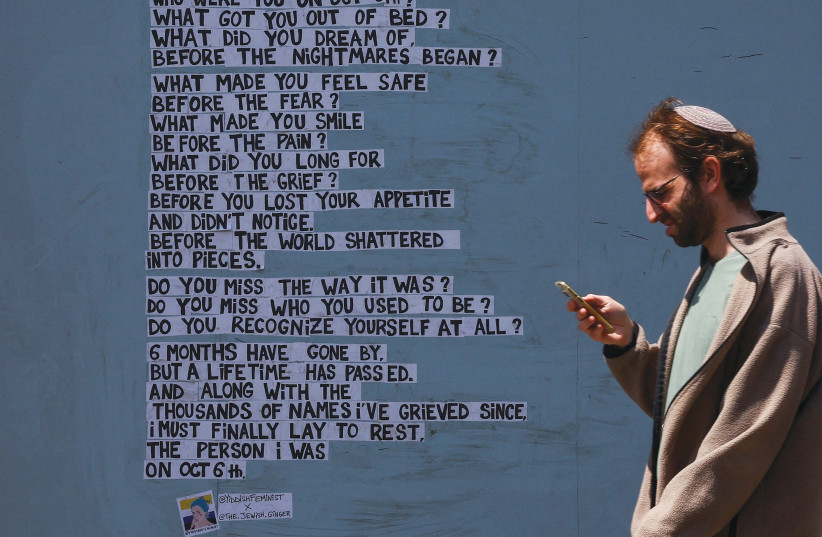When the name “Hamas” is mentioned, images of rockets and terror tunnels immediately spring to mind – along with bands of barbaric murderers in white pickup trucks, brandishing machine guns and Palestinian flags, with bound and bloodied Jewish hostages in tow.
These images, undeniably valid and true, were especially reinforced following the appalling attacks on October 7. Such gory, violent, and horrific acts are emblematic of these terrorists.
Yet, there’s a lesser-known, equally perilous facet of Hamas: their cyber warfare capabilities. Envision thousands of anti-Israel hackers, not with traditional weapons but armed with seemingly innocuous laptops, Python code, and Wi-Fi connections. Their digital arsenal poses a threat as significant to Israel and global democracy as any physical armament.
Across today’s geopolitical landscape, perception and image wield power comparable to physical might. Support for Israel’s self-defense and the acquisition of international funding for weaponry and supplies hinges heavily on political influence and global perceptions of the Jewish state.
In the wake of October 7, the assumption was that the world would be on Israel’s side, feeling bad for a small Jewish state that was attacked, with babies burned alive, women raped, elderly Holocaust survivors beheaded, and young children and mothers kidnapped into the tunnels of Gaza.

But that foolish assumption was quickly proven wrong.
Israel was getting dragged through the mud on every single social media platform as millions silently looked on, painted as the big bad “occupier.” Amid this surge of anti-Israel sentiment online, I saw it was time to fight back in this relatively uncharted arena.
Having professionally dabbled in artificial intelligence-inspired marketing campaigns for everything from trip planning to cheesecake recipes, I thought, “Why not for digital combat?”
So I launched ProjectTruthIsrael.com with a small team of dedicated volunteers. Our mission: to arm folks on social media with AI-driven tools to tackle misinformation and drown out the hate.
The ProjectTruthIsrael.com platform and its advocacy for Israel on the digital battleground
We created a sleek online platform with the brains and brawn to cut through the lies and propaganda. Dishing out fact-packed, pro-Israel, accurate smackdowns to neutralize the hate. With a simple copy-paste action, Jewish social media warriors could now arm themselves with razor-sharp responses, ready to be unleashed on X, Facebook, Instagram, or any digital battleground of choice.
While I harbored no illusions about converting staunch opponents, the goal was to safeguard undecided minds from being swayed by pervasive pro-Palestinian propaganda, and to simultaneously prevent the social narrative from becoming one-sided.
The platform’s adoption exceeded our expectations, quickly amassing over 40,000 users and generating nearly 80,000 responses – spanning the US, Latin America, the UK, and even Australia.
ProjectTruthIsrael.com quickly emerged as a revolutionary, cost-free digital crusade against the rampant anti-Israel narratives on social media. Utilizing artificial intelligence, it provided users with instant, factual rebuttals to disseminate and challenge misconceptions about Israel.
As the project gained momentum, potential partnerships with organizations aimed at expanding our reach to college campuses began to materialize. Envisioned as a digital shield for Jewish students against campus-based hatred, the initiative promised to be an invaluable tool.
However, our success painted a target on our backs. The very mention of truth became anathema to our adversaries, leading to a cyber-attack that not only took down our platform but also incurred thousands of dollars in fraudulent charges.
Despite the setback, the essence of this article is not to dwell on the attack but to underscore the path forward.
It serves as a clarion call to pro-Israel organizations and supporters to fortify their digital domains against cyber threats. The enemies of Israel have demonstrated their willingness to resort to violence and destruction; there is no doubt they would extend their tactics to the digital realm.
Rockets and guns are tangible threats, but in the age of information, cybersecurity is equally vital for Israel’s endurance. The digital battlefield demands as much vigilance and protection as the physical one.■
Abraham Bree is the CEO of Brand_Whatever, a Brooklyn-based marketing agency, and Founder of ProjectTruthIsrael.com, a pioneering AI-powered app that rallied 40,000 online advocates to champion Israel’s cause in the digital realm of social media.
